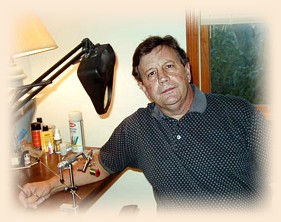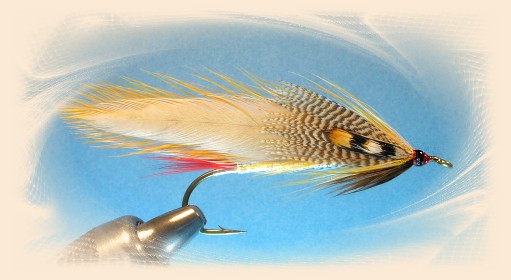This Rangeley Region streamer created by Carrie Stevens
began its life as Captain Bates. When Joe Bates remarked
that he liked the fly, but wished it had a higher rank,
it became Major Bates. By the end of World War II it had
been renamed Colonel Bates, rising through the ranks as
had Joe Bates himself. Colonel Bates and his wife were
frequent visitors to the Upper Dam area in the Rangeley
Region, where Carrie Stevens tied flies and her husband
Wallace guided in the summer. There is a picture in the
book Carrie Stevens of Helen Bates and
Wallace Stevens in a canoe each holding very large trout.
The books Fishing Atlantic Salmon: The Flies and
the Patterns and Streamer Fly Tying and
Fishing by Joseph Bates (the former with his
daughter Pamela) have become classics, and in 1982 he
had this to say about the evolution of the Colonel
Bates fly:
"You ask about the history of the Colonel Bates salmon
pattern. It came from a streamer fly (see Streamer
Fly Tying and Fishing) named for me by Maine's
famous tyer(sic), Carrie Stevens, who tied a streamer
named the "Captain Bates" at the start of World War II.
I kidded her a few times, saying she should have to raise
the rank of the fly. Then, much later, Jimmy Younger,
descendant of John Younger, wanted to tie a fly and name
it for me. I gave him Carrie's pattern and asked him to
do a salmon fly similarly. Both versions are popular here,
but the latter is primarily and exhibition pattern."
- Joseph D. Bates, Jr., 1982
Col. Joseph D. Bates, Jr. was quite a large contributor to
Carrie's success. In Carrie Stevens Graydon
R. Hilliard has this to say:
"Colonel Bates' many magazine
articles about Carrie helped her sales and contributed to
her popularity, and in later years, his books ensured her
a place in sporting history."
There is an interesting letter shown in the book, which
gives us some insight into what a streamer actually is.
It is from Mrs. Carrie G. Stevens to Mr. Falkins, who
ultimately bought her fly tying business. In it, she
lists the recipe for the Colonel Bates as follows:
The Colonel Bates Pattern is Hook-red tag-silver-Throat-brown
Streamers-1 long yellow-2 short white (about 3/8" shorter than yellow)
Shoulder-Light Mallard-Jungle cock
Head-red-black band
Notice the reference here to the streamers. Streamers
were actually the feathers that streamed out behind the
fly, what we would now call the wing. We now call the
entire fly a streamer, but originally, they were just
the feathers that gave the minnow-like look to what was
just another fly. I think the latter makes much more
sense, but have a feeling that I'm 60-70 years too late
to have this changed now. This fly is also frequently
tied with teal at the shoulder, and I've done that here.
Carrie Stevens had just one yellow feather in the wing,
but typically her flies were assembled as glued sides.
Now maybe she meant that each SIDE has on yellow and two
white feathers, I'm not sure. I've done mine with one
white and one yellow per side. Next week I'll show the
Jimmy Younger salmon fly version.
Credits: Carrie Stevens: Maker of Rangeley
Favorite Trout and Salmon Flies by Graydon R. Hilyard
and Leslie K. Hilyard. ~ EA
About Eric:
 I started fly fishing as a teen in and around my hometown
of Plattsburgh, New York, primarily on the Saranac River.
I started tying flies almost immediately and spent hours
with library books written by Ray Bergman, Art Lee, and
A. J. McClane. Almost from the beginning I liked tying
just as much as I liked fishing and spent considerable
time at the vise creating hideous monstrosities that
somehow caught fish anyway. Then one day I came upon a
group of flies that had been put out at a local drug store
that had been tied by Francis Betters of Wilmington, N.Y.
My life changed that day and so did my flies, dramatically.
Even though I never met Fran back then, I've always
considered him to be one of my biggest influences.
I started fly fishing as a teen in and around my hometown
of Plattsburgh, New York, primarily on the Saranac River.
I started tying flies almost immediately and spent hours
with library books written by Ray Bergman, Art Lee, and
A. J. McClane. Almost from the beginning I liked tying
just as much as I liked fishing and spent considerable
time at the vise creating hideous monstrosities that
somehow caught fish anyway. Then one day I came upon a
group of flies that had been put out at a local drug store
that had been tied by Francis Betters of Wilmington, N.Y.
My life changed that day and so did my flies, dramatically.
Even though I never met Fran back then, I've always
considered him to be one of my biggest influences.
I had a career in music for twenty years or so and didn't
fish much, though I did fish at times. The band I was with
had its fifteen seconds of fame when we were asked to be in
John Mellencamp's movie "Falling From Grace." I am the
keyboard player on the right in the country club scene in
the middle of the movie. Don't blink. It's on HBO all the
time. We got to meet big Hollywood stars and record in John's
studio. It was a blast.
So how did I wind up contributing to the Just Old Flies
column on FAOL? I'm not sure, it was something that I simply
wanted very badly to do, and they let me. Many of the old flies
take me back to the Adirondacs and my youth, and I guess I get
to relive some of it through the column. I've spent many happy
hours fishing and tying over the years, and tying these flies
brings back memories of great days on the water, and intense
hours spent looking at the flies in the fly plates in the old
books and trying to get my flies to look like them. And now,
here I am, still doing that to this day. ~ EA
|


 I started fly fishing as a teen in and around my hometown
of Plattsburgh, New York, primarily on the Saranac River.
I started tying flies almost immediately and spent hours
with library books written by Ray Bergman, Art Lee, and
A. J. McClane. Almost from the beginning I liked tying
just as much as I liked fishing and spent considerable
time at the vise creating hideous monstrosities that
somehow caught fish anyway. Then one day I came upon a
group of flies that had been put out at a local drug store
that had been tied by Francis Betters of Wilmington, N.Y.
My life changed that day and so did my flies, dramatically.
Even though I never met Fran back then, I've always
considered him to be one of my biggest influences.
I started fly fishing as a teen in and around my hometown
of Plattsburgh, New York, primarily on the Saranac River.
I started tying flies almost immediately and spent hours
with library books written by Ray Bergman, Art Lee, and
A. J. McClane. Almost from the beginning I liked tying
just as much as I liked fishing and spent considerable
time at the vise creating hideous monstrosities that
somehow caught fish anyway. Then one day I came upon a
group of flies that had been put out at a local drug store
that had been tied by Francis Betters of Wilmington, N.Y.
My life changed that day and so did my flies, dramatically.
Even though I never met Fran back then, I've always
considered him to be one of my biggest influences.